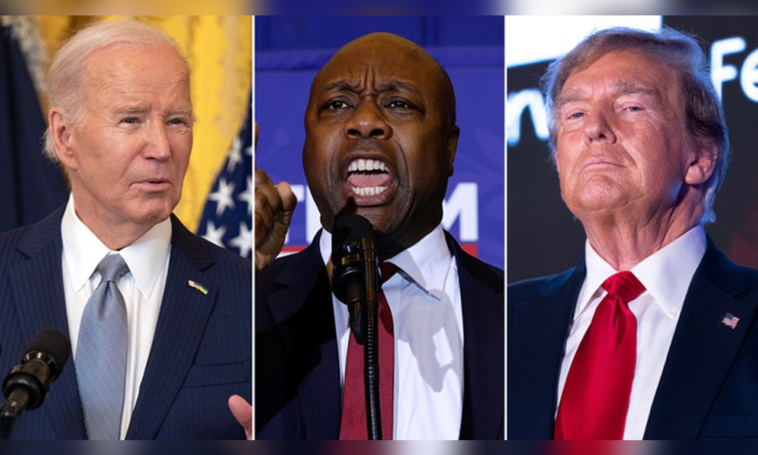Senator Tim Scott criticizes of what he perceives as a double standard in media coverage regarding President Biden’s handling of immigration issues versus that of former President Trump delves into a contentious aspect of contemporary political discourse.
In his recent remarks, Scott pointedly draws attention to the stark contrast between how the media covered Trump’s immigration policies and the relatively softer treatment Biden receives in similar circumstances.
During a recent interview, Senator Scott emphasized the disparity in media scrutiny between the two administrations. He argued that while President Trump faced intense criticism and accusations of xenophobia and racism when attempting to address immigration through executive action, President Biden has largely escaped similar levels of condemnation despite the escalating crisis at the southern border.
Scott’s assertion regarding the media’s differential treatment of the two presidents reflects a broader concern within conservative circles about perceived bias in mainstream media coverage. He contends that the media’s approach to reporting on immigration policies is emblematic of a broader trend where Republican administrations are subject to harsher scrutiny and criticism compared to their Democratic counterparts.
A central point of Scott’s criticism is the substantial increase in border crossings under President Biden’s watch compared to the relatively more controlled border during the Trump era.
“More important, however, is that when we had President Trump in office, we actually had a basically sealed southern border. Crossings were around a thousand a day. Under President Biden in December, we had 10,000 crossings on average per day,” he added.
Moreover, Scott underscores the potential use of executive action by President Biden to address the border crisis, including the consideration of invoking Section 212(f) of the Immigration and Nationality Act. This provision grants the president authority to restrict the entry of certain categories of foreigners deemed detrimental to the interests of the United States.
Scott’s mention of this legal mechanism highlights the complex and contentious nature of immigration policy, particularly in the context of presidential authority and constitutional constraints.
The comparison between Trump’s unsuccessful attempts to use executive action on immigration and Biden’s potential recourse to similar measures underscores the political dynamics at play.
Scott points out that Trump faced sharp criticism, including accusations of xenophobia and racism, for his immigration policies, while Biden has encountered relatively less scrutiny despite considering similar approaches. This asymmetry in media and political reactions underscores broader partisan divisions and ideological differences shaping immigration debates in the United States.
In addition to criticizing media coverage and presidential actions, Scott also weighs in on the recent impeachment proceedings against Homeland Security Secretary Alejandro Mayorkas. The House of Representatives narrowly voted to impeach Mayorkas over his handling of the border crisis, reflecting growing frustration and discontent within certain segments of Congress.
Scott expresses support for Mayorkas’ impeachment and commends the House for its “courage” in taking action. However, he acknowledges the challenges of advancing such measures in the Democrat-controlled Senate, suggesting that broader political considerations may hinder efforts to hold administration officials accountable.
Ultimately, Scott suggests that replacing President Biden would be the most effective means of addressing the immigration challenges facing the country. He argues that a change in leadership is necessary to enact meaningful reforms and restore integrity to the nation’s border security efforts.




One Comment
Leave a ReplyOne Ping
Pingback:KJP says Biden has no plans to announce executive order during border visit - Hard Knock News
Join the Community and Be a Part of the Conversation
You must be logged in or registered to post a comment.